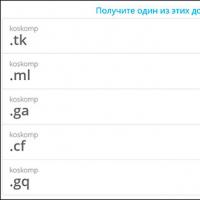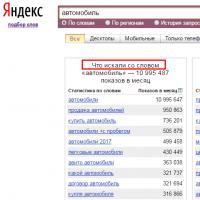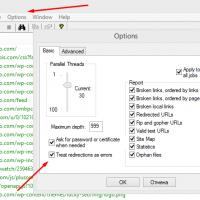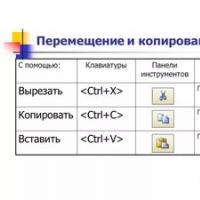Computer Security Mathematical Methods and Software Systems. Specialty "Information Security": Who to work after graduating from the university. Specialty Information Security - who work
Description
Students who have chosen this specialty are engaged in skills:
- use of programming languages \u200b\u200bused in applications for different operating environments to which managerial database management systems and operating network systems are related;
- collecting data required in the process of designing new protective systems;
- compliance with standards and development of technical tasks;
- designing hardware I. softwareproviding security of information based on the technical task;
- performing measures that inspect the performance of hardware and software security software;
- installation, testing, operation and maintenance of funds aimed at protecting data;
- verification of the technical condition of the equipment, conducting preventive work and current repair;
- drawing up operational instructions for safety hardware;
- administering information security subsystems;
- certification of technical means and programs in order to determine their compliance with the requirements and norms of information protection;
- evaluating the degree of reliability of funds used;
- organization of the work of a small team.
Whom to work
The main flow of graduates is sent to various large enterprises and computer organizations. There they occupy positions of IT specialists, programmers and system administrators. Some of them work in narrow profiles with mathematics and informatics. With the development of business in front of many major organizations, the question of protecting information, both from external penetration and inside the system. In this case, they need qualified professionals in this field. Perspectives of career growth make many graduates direct their resume for a vacancy of a specialist in the protection of information on such enterprises.
For admission, the exam is taken in mathematics, as a profile subject, Russian language, and physics or computer science and ICT to choose from.
The passage point, according to a survey conducted by HSE and the Analytical Department of the RAEK, the average passage of the EGE in the regions varies slightly, and between different specialties of information security is significantly different.
The maximum passage point in universities varies from 45 to 86.
Choose a specific specialty, you can consider the nuances and the specifics of the directions: specialty 10.03.01 " Information Security»- Here are the basic knowledge of installing and operating components of the IB system.
- Specialty code - you can get applied technician protection skills.
- The specialty code gives the skill to identify the channels of information leaks and prevent cases.
- The specialty code is the development of threat models for databases and creating programs to protect them.
- The specialty code is the programming and safety of operating, tax, financial, budget systems.
It can be trained in person, after 4 years, passing training at a specialist. There are magistracy and graduate school in some specialties of information security. The correspondence form of training is provided not everywhere, its deadlines vary in different universities. In the sowas, the passing score is significantly lower, but the choice of specialties is narrow.
Specialty Information Security - Universities and Colleges
In which universities there is a specialty information security?
Training of specialists in Russia is conducted in all regions of the country. The distribution of them, however, is unevenly.
Most a large number of IT specialties in Ugatu, they are 19. Next go MSTU them. AD Bauman and Spbniu ITMO. In general, to get an education in the field of information security in 145 universities in Russia. More than 30% of them are located in the Central Federal District.
Specialty Information Security - Universities in Moscow:
1. Academy of FSB of Russia
2. MFU.
3. FGBOU in MGLU
4. Financial University, Financial
5. FGBOU in NIU "MEI"
6. Miigaik
7. FGBOU in Moscow State Engineering University (Mami), University of Engineering (Mami), University of Engineering
8. National Research University MIET; NiU MIET; MIET.
9. OJSC "IMIVT"
10. Niauia Mafi.
11. Academy of GPS Emergencies Ministry of Russia
12. MSTU G.
13. FGBOU in RGAU-MSHA named K.A. Timiryazev
14. FGBOU VO "Russian State Geological Exploration University named after Sergo Ordzhonikidze", MGRI - RGGRU
15. Motusi.
16. MSTU them. N.E. Bauman
17. Military Academy of RVSN named after Peter Great or WA RVSN
18. Moscow University of the Ministry of Internal Affairs of Russia named after V.Ya. Kikotya, Moscow Moss of Russia named after V.Ya. Kikotya
19. Miera, MGUPE
Students study the multi-level Cisco and Oracle security systems, gain skills to work with specialized equipment, blocking information leaks, practice search for hidden camcorders and radio layers, blocking information transmitters using various Sonata complexes, Curtains, Barhan.
Specialty Information Security - who work
Where to work with specialty information security?
Work in the specialty information security with the acceleration of their knowledge and implementation of the capacity for both students and graduates can be offered in IT companies, government agencies, in operators of telecommunication systems, as well as participating in international tournaments. Large players The IT market is sent to such events Hed Hunters, and subsequently make suggestions to participants.
Gregory Bakunov, Director of Dissemination of Yandex Technologies and Dmitry Voloshin, Director of the Department of Research and Education Mail. GROUP, are jointly the fact that there is a personnel hunger.
Since August 2016, Cisco has launched a scholarships in which 10 million dollars invested invested. It is designed to increase the number of specialists with the preparation necessary for this area. The program will be implemented in conjunction with authorized training partners, among which there are many Russian universities.
According to the results of a survey conducted by apkit and the WTCIOM, only 13% of IT-university graduates confirmed that education in the university can be applied in real work. But, as Alexey Sokolov told, Deputy Minister of Communications and Mass Communications, the number of budget seats increased by 70% for 2 years, and it is planned to achieve larger increase control digits of reception.
There is hope that the quality of education in this area will also increase, although, in REC, it is believed that, despite the increasingly active support for IT-education by the country's leadership, the problems of insufficient competence of IT specialists, inertness of curricula, incompetence of theoretical teachers are still relevant.
Specialists in informational Safety takes direct participation in creating a system for the protection of information, its audit and monitoring, analyze information risks, develop and implement measures to prevent them. The profession is suitable for those who are interested in computer science (see the choice of a profession for interest in school subjects).
Their competence also includes installation, configuration and support of technical information security tools. Safety specialists teach and advise employees on information protection issues, develop regulatory and technical documentation. This position arose at the junction of two directions. information technologies and security technologies. Without information security officers today, neither commercial structures nor departmental organizations such as the FSB cannot do.
Features of the profession
This profession arose at the junction of two directions: information technology and security technologies. Without information security officers today, neither commercial structures nor departmental organizations can do. They prevent leakage important information, Forgery of data and incompetence (evil intent) of own employees. On a state scale, information security specialists create systems for the protection of strategic information on the country's defense capability, form secret databases, maintain the mystery of the nuclear suitcase.
Pros and cons profession
Pros:
- real estate in the labor market, as the selection of information security is rapidly developing, and therefore the demand for specialists in this area will constantly grow;
- high wage;
- the ability to master the most advanced information protection technologies;
- the ability to attend conferences and seminars;
- communication with a variety of experts, the ability to link useful links.
Minuses:
- high Responsibility, as you have to be responsible for the safety of all the company's information;
- frequent business trips are possible.
Place of work
In organizations of various forms of ownership having their own computer networks and in need of conservation of corporate information and important commercial information.
Important qualities
Communicability and skill work in a team. Creation and commissioning of protection systems is a collective work of several specialists: the head of the company's protected company, analytics, system designers, programmers. Everyone needs to find an approach and be able to put a task understandable to them.
Where to learn from information security specialist
Higher education:
Universities
The Russian Institute of Vocational Education "IPO" is a set of students to receive a specialty on a remote program of professional retraining and advanced training. Education in the IPO is a convenient and rapid receipt of distance education.
200+ training courses.
8000+ graduates from 200 cities.
Suggested deadlines for paperwork and training external, interest-free installments from the institute and individual discounts. Contact!
We invite you to familiarize yourself with our list.
Information security specialist should know all Web environment technologies, as well as understand the ways of hacking access and damage to networks and projects.
Salary
Salary on 09/12/2019
Russia 20000-90000 ₽
Moscow 45000-135000 ₽
The level of remuneration of a specialist is determined by the welfare of the company, a list of job responsibilities, experience in the specialty, level of development of professional skills.
Stairs Career and Perspectives
By itself, this position is already one of the highest steps of career growth in the field of IT, above only the post of head of the department or information security department. IT experts with incomplete or finished higher education, and experienced administration of information and operating agents can start a career in this field. windows systems or UNIX. Employers' requirements for professional skills and skills of novice specialists are quite serious: even the applicants for a relatively low income should know the legislation of the Russian Federation for information security, the principles of operation of networks and means of cryptocrusts, modern software and hardware for information protection, as well as information security technologies. Salary on which young specialists can count on in the capital, from 40 thousand rubles.
The next level is a specialist with higher education in information technology or information protection, which has experience in providing information security for at least 2 years. In addition, applicants must have experience in conducting an audit and assessment of the risks of the information security system, the development skills of the regulatory and technical documentation for information security, to know international standards for information protection and own English at the level sufficient to read technical literature. Experts that meet the above requirements earn in Moscow to 80 thousand rubles.
Over the past few dozen years of technological progress, the information has become new Meril. The number of people employed in the field information Developments, grows exponentially.
Dmitry Tretyakov
MSC INFORMATION SYSTEMS SECURITY
Due to the high cost of information as an asset of the company in the industry, new players emerge, whose goals are reduced to the illegal possession of these assets. Moreover, the security of information is influenced by a human factor that leads to an unintentional leakage, modification and inaccessibility of information. In the aggregate, this gives rise to the need for a relatively new form of activity - complex IB.
You can distinguish two main directions in IB: technical and organizational. The first includes specialists who have the following knowledge: setting up and administering SZI, programming languages, ability to "exhaust" common vulnerabilities, such as SQL Injections, Cross-Site Scripting, Request Forgery, DOS attack, operation of Windows, Linux at the highest level and much more.
Education in Entrance Level
Due to the accelerating technological progress, the IB scope dictates new, ever-changing requirements for their specialists. But what level specialists do universities are preparing at Entrance Level? In order to answer this question, the curricula of Russian universities in the following specialties were analyzed:
Specialists in the organizational direction must be perfectly to draw up documentation on IB, carry out the analysis of the risks of the organization, not only to know perfectly domestic standards Information security, but also leading world, such as ISO 2700x, NIST COBIT. Often, organizations require a candidate knowledge in both directions.
- "Comprehensive information security automated systems" (090105);
- "Organization and technology of information protection" (090103);
- "Computer Security" (090102);
- "Complex protection of informatization objects" (090104);
- "Information Security" (090303);
- "Information Security of Automated Systems";
- "Organization and technology of information protection" (090905).
The main emphasis of educational programs is made on a mathematical apparatus, which includes knowledge of higher mathematics and complex cryptographic algorithms, such as elliptic curves and solving equations over fields and deduction rings. Most of the educational programs occupy languages \u200b\u200band programming methods. More profile modules include such as:
- "Safety operating systems";
- "Safety of networks";
- "Technical means and methods of information protection ";
- "Software and hardware protection of information";
- "Organizational Support of Information Security".
For the first two years, students actively study such disciplines as: "Electrical engineering and circuitry", "hardware computer equipment"," Economy ", etc. etc. Moreover, the personnel composition russian universities - As a rule, people who have been educated in the distant 1970s or earlier. Undoubtedly, learn to have something, but if we talk about modern directions of IB, then these knowledge is not enough. As a result, at the exit from the university, if a person follows a purely curriculum and does not engage in self-education, we receive a specialist, absolutely not ready for real market requirements.
Modern demands
Sometimes it is ridiculous to look at the demands of Russian employers and the salary offered by them. There are also those that copy the requirements from foreign companies and at the same time offer salary 5-6 times lower. Despite today's undervaluation on russian marketWith the deepening of contacts with the Western world, the attitude towards a specialist in information security should change for the better.
Under the condition of the rapid technological development during the training of the future specialist, the real situation in the labor market can change many times in the root. Taking into account the fact that the update of Russian educational programs occurs extremely rarely and with great difficulty, we receive not only an incorrectly balanced program, but also significantly retained from real progress.
But what does the market require from experts? To answer this question, an impressive list of vacancies was analyzed on one of the leading employment sites - Headhunter.ru.
First of all, applicants require PD protection skills, as well as knowledge of the main federal laws On IB, guests, regulatory documents FSTEC and FSB. Mandatory knowledge of modern methods and means of information protection. Not only knowledge is desirable, but also the availability of a certificate for the international standard ISO 27001. Level of English language - Starting from the reading level of technical literature. Not unnecessary skills work with network equipment Cisco and appropriate certificates. Practical knowledge is welcomed in the search and operation of vulnerabilities, as well as participation in hacker competitions. But the most knockout requirement is to work with everything that is written above, at least two years.
Wage level
Wages in accordance with the applicant's compliance with the above requirements varies significantly depending on the region and the company's level. The main share of jobs is concentrated in Moscow. Here the candidate will be offered a salary in the amount of from 40,000 to 60,000 rubles. With the same requirements in the cities of St. Petersburg, Kazan, Ufa, Novosibirsk and other million babes, the applicant will be offered salary from 30,000 to 40,000 rubles. If we consider cities with a population less than a million, then the situation is overshadowed even more: wages - from 18,000 to 30,000 rubles.
In order to become a popular information security specialist, it is necessary to invest minimum of 800,000 rubles. But even this will not help immediately start a career, as one of the main requirements is the experience in the industry. Even if you were lucky and you immediately got a job in Moscow in Moscow, the beneficity of education will take 1.5 years, considering all earned funds. For comparison, in London, education will pay off in four months.
The next step of the career ladder begins with practical experience with specific information protection tools, the presence of certificates such as CISSP and CISA. Among the requirements, you can often find experience in conducting an IB audit. And, of course, experience in this sphere from 3-6 years. If the candidate meets all these requirements, then the salary in Moscow will be 60,000-90,000 rubles, in the regions - 50,000-70,000 rubles. In small cities, specialists of this level are practically not required.
By and large, the requirements in IB are not too different around the world. The difference only in the knowledge of local legislation on IB, individual means of protection, compulsory standards, which often applies to ISO 27001 and COBIT, as well as in knowledge and experience in areas such as Business Continuity Plan and Disaster Recovery Plan ISO 22301. The greatest difference between foreign Vacancies from domestic - level wages. To determine the largest foreign search resource, Monster.com was taken as the basis. First level In London begins with salaries (translated to the Russian ruble) from 150,000 rubles. "Pure" per month. In the presence of experience and certificates, the wage level increases to the amount of 60,000-90,000 pounds per year, which in the Russian equivalent is 250,000-375,000 rubles. per month.

Now we calculate the payback of the education of the IB specialist.
Higher education 400 000-600 000 rub. For 5 years of study.
Preparation and passing of the Cisco CCNA exam - 25 000-30 000 rubles, CCNP - 37 000-15 000 rubles.
ISO 27001 LEAD IMPLEMENTER TRAINING COURSE - 150 000 RUB., ISO / I EC 27001 LEAD AUDITOR TRAINING COURSE - 150 000 RUB.
Certified Information Systems Auditor (CISA) - 90,000 rubles, including the exam.
Certified Information Security Manager (CISM) - 90,000 rubles, including the exam.
Certified Information Systems Security Professional (CISSP) 100 000 rub., Not counting the exam, + 5 years of experience.
MSC Information Systems Security - 500,000-1,000,000 rubles.
In 2005, in Krasnoyarsk to obtain education in the field of information protection, it was possible to enter Krasnoyarsk State Technical University (now Polytechnic Institute of SFUs) or to the Siberian State Aerospace University. I chose the latter, I especially chose a huge rocket painted on the facade, and the word "cosmos" in the title. In Sibgaau, in turn, had to choose from two directions: 090105 "Complex security of information security of automated systems" and 090106 "Information security of telecommunication systems" (qualification in both cases - a specialist in the protection of information), in Polytech was a specialty 090102 "Computer Security" ( Qualification - mathematician). Between the "integrated" and "telecommunications" security, I chose the last and did not regret. Programs are completely different, our training was devoted to mainly studying the basics of communication in all its manifestations (radio, cellular, wired communication).
Five and a half years, we built a communication channel models, painted transmitters and receivers, calculated the characteristics of the signals, studied noise-resistant coding. And all this under the guidance of the former military (there is its own romance). For those who like physics, and especially the section "fluctuations and waves" (probably the most difficult in the school program), the specialty "Telecommunication Security" was fully suitable. Many of my friends and acquaintances studied on " Complex security"And we had some common classes, although their program, in my opinion, was more terrestrial. But it was in it more work with computers and legislation. The spouse ended the Polytech - they had a lot of mathematics (as we have physicists).
What now?
Everyone has changed a couple of years ago and now in Sibgua you can learn to bachelor in the direction of 10.03.01 "Information Security" and at a specialist in the specialty 10.05.02 "Information Security of Telecommunication Systems" (my specialty under the new title)(link) . SFU directions are indicated . In Tomsk, teach information security in Tusura ( link ). Immediately I note that the specialties are closed, which means that persons with citizenship of other countries (as well as with double citizenship) are not accepted.
Is it easy to learn?
I would say that it is quite difficult to learn, a lot of home independent work, exchange and typical. Constantly had something to calculate and count. Very many physics and mathematics. Girls used to learn a little earlier, now much more. We have for a group somewhere out of 27 people accounted for three girls. For those who believe in horoscopes an interesting detail - all three had a sign of Zodiac Scorpio, they say that there is a predisposition to technical sciences. Another interesting point is the number of gold and silver medalists - half of the group.
What is common between learning and work?
Unfortunately, most knowledge gained was not useful. The most useful was to study the legal and organizational foundations of information security under the semi-annual course. All computer security items were also useful, but telecommunications - no. At the university I did from the second course scientific work And she went to scientific seminars, it seems to me that they gave me more than all the items :) The rest of the knowledge made it from books, magazines, the Internet and production practices.
Is it difficult to find a job?
There are different opinions, but in your own experience and experience of our friends and friends I can say that it is difficult to find a job, but you can. I work already in fourth place and every time in a specialty. And the first and second workplace It was still while studying, so even with the incomplete higher education work is real. Freelance find difficult, after all, to perform work on technical Protection Information is needed licenses that are given to the organization and get them very hard. But you can find yourself a workplace in the company providing information protection services, then the salary will directly depend on the number of customers. If you want stability - it is better to go specialist in protecting information on production.
Wage
On average, lower than the programmers and part-time work is more difficult to find. But usually higher than that of system administrators.
What does a specialist do?
Directions of work are very much, even with the same name of the post. Installing and configuring information security tools, writing instructions and information security provisions, user training for methods of safe operation, work with cryptographic means, investigation of incidents and much more.
Minuses
By cons, I would attribute:
- a small selection of jobs (compared with programmers and other IT professionals);
- low salary size, part-time complexity;
- work with the large quantity documentation.
 How to pay a domain name
How to pay a domain name Domain zone of tokelau islands
Domain zone of tokelau islands What is domain what problems may be
What is domain what problems may be Yandex Wordstat: detailed instructions for using the service and grouping operators and a complicated request
Yandex Wordstat: detailed instructions for using the service and grouping operators and a complicated request Editing DBF files
Editing DBF files Xenu Link Sleuth - What is this program how to use the Xenu program
Xenu Link Sleuth - What is this program how to use the Xenu program Methods Copy and insert text from keyboard without using mouse
Methods Copy and insert text from keyboard without using mouse